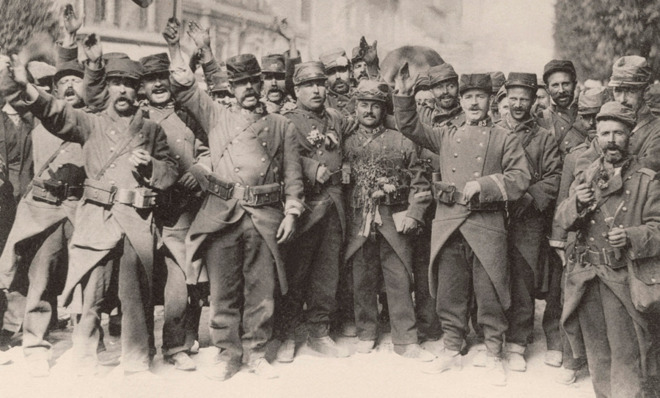2014: The year of bad World War I analogies
This year marks the 100th anniversary of the Great War. Cue the illogical comparisons.

A free daily email with the biggest news stories of the day – and the best features from TheWeek.com
You are now subscribed
Your newsletter sign-up was successful
This year marks the hundredth anniversary of the outbreak of the First World War. To commemorate these tragic events, there will be ceremonies and speeches, remembrances and reflections, and, for many pundits, attempts to analogize the Great War to whatever happens to be at the top of the news cycle.
We can see the beginnings of this already. Writing in National Interest on New Year's Day, Allison Graham drew parallels between the pre-World War I period and current tensions between Japan and China. In this telling, Japan is Austria-Hungary, a formerly great power now menaced by a rapidly industrializing and nationalist Russia (China), and relying increasingly on its stronger ally Germany (the United States) for protection. Or maybe China is Germany, Japan is France, and the United States is Great Britain, which risks getting drawn into a larger conflict to protect a smaller, Belgium-like nation caught between the two, such as Taiwan or South Korea. The specific match-ups of the analogy will be less important than the unifying fact of the ominous parallels between 1914 and today.
But it won't stop there. If 2014 sees increased unrest in Syria, or tension over Iran's nuclear program, you can expect people to talk about the Middle East as a "new Balkans." If economic woes persist in Europe, someone will undoubtedly go on television to proclaim the European Union a "new Habsburg Empire" or suggest that Germany fiscal policy was "an economic Schlieffen Plan."
The Week
Escape your echo chamber. Get the facts behind the news, plus analysis from multiple perspectives.

Sign up for The Week's Free Newsletters
From our morning news briefing to a weekly Good News Newsletter, get the best of The Week delivered directly to your inbox.
From our morning news briefing to a weekly Good News Newsletter, get the best of The Week delivered directly to your inbox.
There's nothing wrong with trying to learn from history, of course. We all know the hoary sayings about history repeating itself. But there's reason to think that 2014 may be a particularly bad year for World War I analogies. Psychology has shown that human beings are subject to availability bias, calculating how likely it is that something will happen by how easy it is to think of similar examples. Since discussion of the Great War will already be in the air, it's only natural that any similarities between events today and those of 1914 will spring readily to mind, even if the connection is somewhat tenuous.
Sci-fi author David Brin recently noted that the years 1814 and 1914 shaped the course of their subsequent centuries, and wonders whether the same might be true of 2014. As Brin concedes, this is "wholly unscientific, superstitious pattern recognition," but he's really just describing a thought process that is quite common, if only subconsciously. Rationally we know that 100 years is just an arbitrary time period, and there are no forces of history that make events recur on a century-long cycle. But due to availability bias, it doesn't matter.
Since we can't stop being human, availability bias is something we have to learn to live with. For 2014, one way to avoid the Great War analogy trap might be to read up on other times and places. Autumn in the Heavenly Kingdom offers an up-to-date history of China's Teiping Rebellion, which while not as well known in the West as World War I, was equally if not more destructive. Or you could pick up Steven Pinker's Better Angels of Our Natures, which argues that war and violence are becoming less frequent over time. Or, if you don't have time for a 900-page book, there is this great website, Wikipedia, that has brief articles on a wide variety of topics.
If you're like me, though, the lure of Great War-related reading is going to be too strong this year. And that's fine, too. Just remember, when you hear someone comparing the situation in South Sudan to the July Crisis, that we're only human.
A free daily email with the biggest news stories of the day – and the best features from TheWeek.com
Josiah Neeley is a Policy Analyst for the Armstrong Center for Energy and the Environment at the Texas Public Policy Foundation.
-
 Magazine solutions - February 27, 2026
Magazine solutions - February 27, 2026Puzzle and Quizzes Magazine solutions - February 27, 2026
-
 Magazine printables - February 27, 2026
Magazine printables - February 27, 2026Puzzle and Quizzes Magazine printables - February 27, 2026
-
 ‘The forces he united still shape the Democratic Party’
‘The forces he united still shape the Democratic Party’Instant Opinion Opinion, comment and editorials of the day